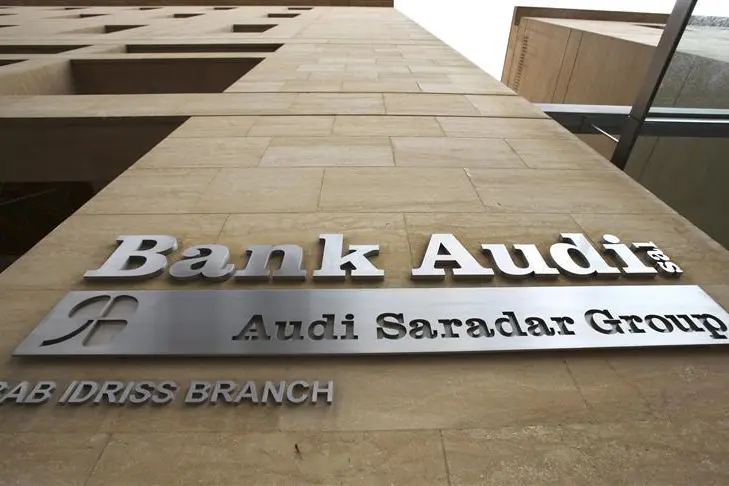PHOTO
At the beginning of March, dozens of Lebanese citizens with British passports saw their life savings evaporate before their eyes when Bank Audi told them their accounts had been closed.
The move came in an apparent retaliation for Lebanese-British businessman Vatche Manoukian’s UK court case ruling that forced the lender to transfer the depositor’s money that had been frozen in his account since the beginning of the Lebanese financial crisis in 2019.
But despite winning the case, Manoukian did not receive yet an official confirmation from Bank Audi that it will pay him back his money.
Anticipating further lawsuits, Bank Audi, SGBL and other leading Lebanese lenders quickly drafted bank checks left to their clients at notaries that can neither be cashed, transferred nor used to open other accounts, a move seen by many as illegal.
This unexpected action by the Lebanese banks infuriated depositors, and this week over a hundred of those affected will file a lawsuit against Bank Audi, followed by a petition to be sent to the UK parliament’s website.
Karen Karam, one of the dual national depositors affected by the Bank Audi case, explained that the magnitude of the scandal prompted her and many others to fight these banks in a bid to retrieve their money.
“The problem in Lebanon is that the judiciary system has never condemned corruption and, therefore, it has become a common assumption that no one will do anything about it,” she told Arab News.
“How can we continue to sit and watch all our hard won money disappear in front of our eyes and not act and speak up?”
Karam stressed what the banks are using is a form of blackmailing their clients to sign waivers with unjust terms and conditions to avoid lawsuits, in return promising to reopen their accounts but with further fund losses on the client’s side.
“This is completely unacceptable and we refuse to sign this document,” Karam emphasized.
Since the phone calls by Bank Audi on March 1, all eyes are set on the Depositors Union.
Founded in late 2019 after the freezing of the bank accounts, the union has been continuously and relentlessly offering advice and taking action to defend the rights of the depositors.
“The Union is working with a team of lawyers to reopen closed bank accounts and issue a collective lawsuit. We are in constant talks with the British Embassy that has shown support for this case. Although we are still at the beginning, we are hopeful we’re going to have justice,” said Dana Kahil Trometer, who is part of the union’s coordination and PR committee.
“We have been organizing ourselves and bringing back confidence and awareness to depositors that they are not helpless,” Trometer explained.
Trometer cited a spokesperson of the British Embassy as saying: “The matter has been deemed very serious and distressing.”
She added: “The British Embassy is not able to offer legal advice. Citizens should seek legal advice for themselves, from the list of lawyers on the UK government website. What we see is symptomatic of Lebanon’s failing economy and the government’s lack of action in creating economic reforms to avoid a deepening crisis.”
She confirmed that, contrary to current rumors, all British-Lebanese citizens, whether they are UK residents or not, are treated equally with no discrimination.
The reason why so many dual nationals opened accounts in Lebanese banks was due to high interest rates offered for new depositors in dollars as well as Lebanese pounds.
Given the Lebanese pound was pegged to the dollar, it seemed like a risk-free plan.
This, however, came tumbling down when the high rates became unsustainable and dollars from Lebanese bank accounts were transferred abroad after rumors that Banque du Liban was unable to inject liquidity.
This was further exacerbated by the 2019 mass protests sparked by the government’s plan to tax WhatsApp calls, vital for the Lebanese population to remain in contact with its diaspora.
So far, the Lebanese government has been busy shifting the blame from one of its members to another, neither taking action nor taking responsibility for the devastating crisis that has reached boiling point and described by the World Bank as one of the worst economic collapses in the world since the mid-19th century.
The situation has reached such dire levels that earlier this year an armed man took hostages at a bank, demanding the return of all his money.
Dina Abou Zor, one of the lawyers and founding members of the Depositors Union, describes the Bank Audi case as one of the most discriminatory since 2019, breaching all laws of the banking sector.
“The first initiative is to gather and inform the depositors abroad, making them aware of the directions to take and of their rights,” Abou Zor said. “We are in a race against the clock in order to reopen as many accounts as possible given the banks have issued a 10-day grace period to reject the signing of their terms and conditions.”
She and her team are filing lawsuits in Lebanon and in the UK as well as suing through correspondent banks that have evidence of suspicious acts and money laundering by members of the Lebanese government.
When asked what the British Embassy can effectively support, Abou Zor said that the British and all other embassies need to put pressure on the Lebanese government to urgently set in place a financial restructuring plan with capital control, one that has been due since 2019.
“We now have dozens of these lawsuits daily in Lebanon because people understand that they have to take matters into their own hands as has become custom in Lebanon,” she concluded.
Copyright: Arab News © 2022 All rights reserved. Provided by SyndiGate Media Inc. (Syndigate.info).





















